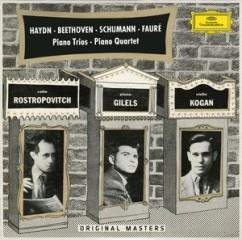Emil Gilels, Leonid Kogan, Mstislav Rostropovich – Piano Trios (2008)
Emil Gilels, Leonid Kogan, Mstislav Rostropovich – Piano Trios (2008)

CD1 Franz Joseph Haydn (1732 - 1809) Piano Trio in G minor, H.XV No.19 1.1. Andante – Presto 8:29 2.2. Adagio, ma non troppo 3:59 3.3. Presto 3:30 Ludwig van Beethoven (1770 - 1827) Piano Trio No.9 in E flat, WoO 38 4.1. Allegro moderato 4:31 5.2. Scherzo (Allegro ma non troppo) 3:48 6.3. Rondo (Allegretto) 5:23 Piano Trio No.7 In B Flat, Op.97 "Archduke" 7.1. Allegro moderato 12:48 8.2. Scherzo (Allegro) 11:44 9.3. Andante cantabile, ma però con moto - Poco più adagio 12:16 10.4. Allegro moderato 7:01 CD2 Franz Joseph Haydn (1732 - 1809) Piano Trio in D, H.XV No.16 1.1. Allegro 9:55 2.2. Andantino più tosto allegretto 4:57 3.3. Vivace assai 4:07 Robert Schumann (1810 - 1856) Piano Trio No.1 in D minor, Op.63 4.1. Mit Energie und Leidenschaft 11:58 5.2. Lebhaft, doch nicht zu rasch 4:38 6.3. Langsam, mit inniger Empfindung 5:01 7.4. Mit Feuer 7:19 Gabriel Fauré (1845 - 1924) Piano Quartet No.1 in C minor, Op.15 8.1. Allegro molto moderato 8:15 9.2. Scherzo (Allegro vivo) 5:26 10.3. Adagio 7:50 11.4. Allegro molto 7:41 Mstislav Rostropovich – cello Emil Gilels – piano Leonid Kogan - violin Rudolf Barshai – viola
Following Rostropovich: Early Recordings, this is a companion Original Masters specially priced 2-CD set featuring the great Russian cellist. With Leonid Kogan and Emil Gilels, his regular partners (and great artists in their own right) in the 1950s, Mstislav Rostropovich emerges here as an exceptional team-player, in polished performances of five piano trios and Fauré's First Piano Quartet, where the young Rudolf Barshai (viola) joins the ensemble. ---Editorial Reviews, amazon.com
The Kogan-Rostropovich-Gilels trio made a small but memorable series of recordings, almost all of which have reached a lustrous status in the annals of recorded music and none more so than the Schumann D minor and the Archduke. DG restores the two Haydn, two Beethoven and the Schumann trios and adds the well-known Fauré C minor Piano Quartet where the trio was joined by the illustrious violist Rudolf Barshai. The retro artwork is another nice touch, though there’s nothing retro about the performances.
It has to be acknowledged that their Haydn is moulded in warmly romanticised fashion. Gilels leads with vibrant, tonally expressive contributions from his string partners. There are well judged dynamics in the slow movement of the G minor Trio and elegant precision in its finale. Gilels’ clipped phrasing illuminates the opening Allegro of the D major and there’s virility in the exchanges between piano and strings in its finale. Kogan plays with especial plangency.
The E flat major trio is early Beethoven and isn’t inflated beyond its natural bounds. Still, there’s plenty of attractive phrasing not least in the answering patterns between Kogan and Rostropovich in the Allegro moderato. But the Archduke takes the prize amongst this quartet of performances. Subsumed virtuosity, corporate identification and tonal homogeneity mark out the parameters of a performance that is one of the most impressive on record. The sheer refinement of the phrasing is a miracle in itself - pellucid beauty of tone is allied to acute structural imperatives and keeps everything alive – with playing that is assertive but never aggressive in execution. Though the recording does splinter in fortes – noticeable especially in the Scherzo and an inevitable corollary of the Moscow studio’s deficiencies – and therefore there is a lack of optimum clarity, the sense of tension and articulated rhythm is astonishing. Fluid, flowing and expressive but always con moto – that’s the slow movement. This trio’s gift is one of quivering, refined sometimes agitated eloquence. The finale is vivacity itself.
Vying for the prize even in this outstanding collection in the Schumann, which in some ways is even the superior of the Archduke. The magical half tints, the painterly perspectives and gradations of tone that illumine the trio are examples of the very best kind of ensemble playing. There’s a superfine sensibility at work, a quicksilver control of colour and texture. The desolate introspection of the slow movement and, elsewhere, its urgent lyricism lifts this kind of playing near to the Parnassus of narrative perception. Kogan’s lofty purity, Rostropovich’s keening elegance, and Gilels’s binding virtuosity ensure a reading of still magical beauty.
After which, though many sing its praises, the Fauré comes as something of a letdown. Confident and striding though the opening might be, I’ve always found its Scherzo, for all the jocularity of its wit, lacks Gallic refinement. And for all the beautifully coloured generosity and pliancy of phrasing in the Adagio it has always struck me as too tightly and heavily bowed. Others, as I say, don’t share these reservations.
Let’s not end carping though. Other companies have released this material. Doremi for example currently has a five CD set [7921] which includes their other recordings, of Mozart’s K254 and K564 trios, the Tchaikovsky, Shostakovich Op.67 and Saint-Saens Op.18. This set also includes recordings Gilels undertook with Dmitry Tziganov, Sergei Shirinsky and also horn-player Yakov Shapiro – the Borodin trio in D and the Brahms Horn trio. One hopes however that DG will collate the remaining Kogan-Rostropovich-Gilels recordings in another two-disc release such as this, one that will sit in perpetuity on any true music-lover’s shelf. ---Jonathan Woolf, www.musicweb-international.com
download (mp3 @320 kbs):
yandex 4shared mega mediafire cloudmailru uplea zalivalka








